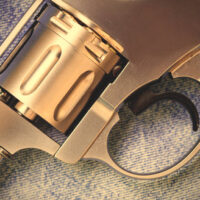Consequences For Unlawful Possession Of Firearms In Florida

A previously convicted felon is released on parole after serving ten years hard labor in prison. Upon release, he is invited to go sport hunting with friends. On the way home from their excursion, police make a traffic stop for speeding. He is asked to show identification, and police determine he is a convicted felon and is therefore barred from owning or using a firearm, even for hunting purposes. He is subsequently arrested for violating the terms of his parole and for possessing a firearm with felon status in Florida. What are his options, and what are the laws on unlawful possession of firearms in Florida?
Florida Gun Ownership Laws
In Florida, there is a three day waiting period, but no background check to purchase a firearm. However, you must be a Florida resident to purchase a weapon in the State. Hillsborough County expands the waiting period to five days. Residents must be at least twenty one to purchase a handgun, or eighteen to purchase a long rifle or shotgun. Defendants convicted of a misdemeanor for domestic violence are ineligible to obtain firearms lawfully. Respondents who have a restraining or peace order against them pending a domestic violence hearing also cannot obtain firearms. In addition, Defendants convicted of felonies are also barred from gun ownership under Title 18 of the U.S. Code 922(g).
Penalties for Unlawful Possession
If a convicted felon is caught with illegal possession of a firearm, they can be charged with unlawful possession of the firearm, which is a misdemeanor. If convicted, the felon could serve up to 15 years in prison and $10,000 in fines, in addition to even more possible jail time for violating the conditions of his parole. Florida also enhances penalties if the weapon was used in the commission of a violent crime or homicide. Using a weapon unlawfully in the commission of violence garners a minimum ten year sentence, and using a weapon to wound or kill a victim garners a mandatory minimum twenty year prison sentence. The penalties are steep, and it is wise to know your rights to own or possess a weapon before you go out using one, or you could pay dearly.
Obtaining Lawful Possession after Conviction
Defendants convicted of a misdemeanor are usually not barred from gun ownership upon release. In addition, defendants convicted of felonies can still file an application for ownership if their conviction was expunged from public record. However, expungement is not automatic. The person must apply for expungement and it is not always granted. Usually there is also a waiting period in order to apply upon release from imprisonment. Finally, some crimes completely bar released felons from ever owning or possessing a deadly weapon again, including violent crimes like murder, assault with a deadly weapon or carjacking. If you have questions about the expungement process, call attorney Bryant Scriven.
Call Attorney Bryant Scriven Today
If you or a loved one were arrested for unlawful possession of a firearm, violation of your parole or another weapons charge, you know the consequences can be dire. You could serve an additional prison sentence in addition to violating the terms of your parole. Tampa criminal attorney Bryant Scriven has experience in all types of criminal law cases and has helped thousands of clients in similar situations. He can assist you too. Call today to schedule a free consultation.
Resources:
fdle.state.fl.us/FPP/FAQs2.aspx#:~:text=Must%20be%20a%20Florida%20resident%20to%20purchase%20a%20handgun.&text=Florida%20does%20not%20require%20a,and%20delivery%20of%20all%20firearms.
leg.state.fl.us/statutes/index.cfm?App_mode=Display_Statute&URL=0700-0799/0790/Sections/0790.01.html
